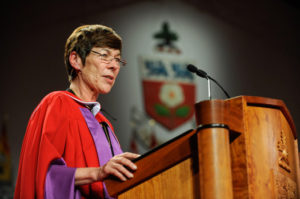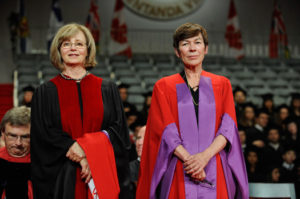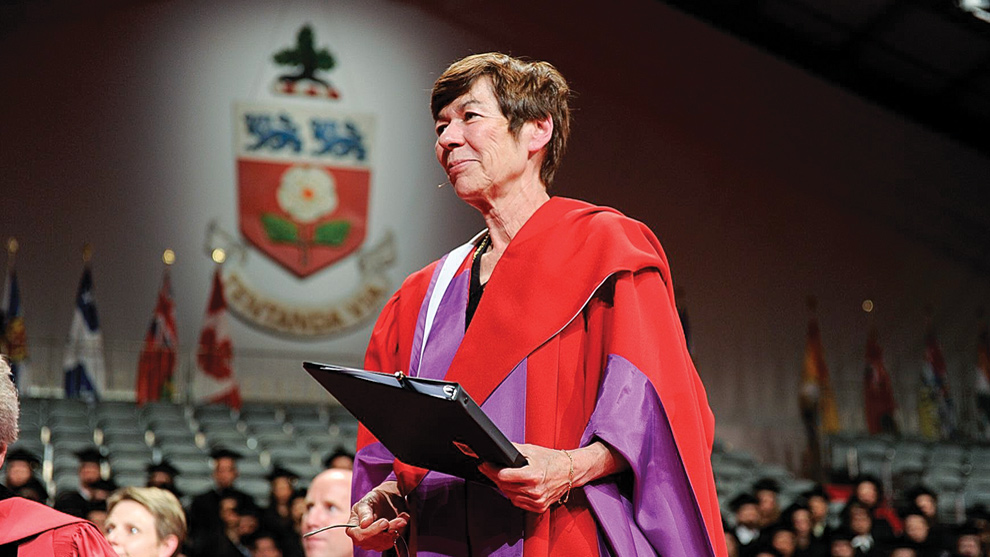Mike Sholars
Features & Opinions Editor
When I started, there were few women who were litigators, let alone criminal defence lawyers,” says Marlys Edwardh. In her Toronto office overlooking Dundas Street; stacks of paper for an upcoming trial dominate the space. “By the time I was 40, I was the oldest [female] criminal defence lawyer in the country.”

This happens often, speaking with Edwardh: she’ll casually mention something revelatory about how different Canadian law was just a few decades ago. She speaks with a practised consistency and clarity, like she’s done this dozens of times before. In fact, Edwardh grants few interviews.
“I have a view that, largely, one’s work defines what one will be in the public domain. If [the interview’s] work related, and people need to understand issues or cases or decisions, I’m very pleased to comment,” she says. “As long as it doesn’t have anything to with me, personally. It’s a bias I have.”
Indeed, her work speaks for itself.
Marlys Edwardh, born March 6, 1950, graduated from Osgoode Hall Law School in 1974, after getting her BA at Carleton University in 1971. She then passed the bar and completed her articling at the law firm of renowned defence lawyer Clayton Ruby. Edwardh was made partner.
She continued her partnership with Ruby until 2008, at which point she created the firm she currently runs, Marlys Edwardh Barristers Professional Corporation. They focus mainly on criminal and constitutional law, in particular cases of human rights violations and the defence of individuals with mental health disorders.
She does good work, and she’s often recognized for it. In 2010 alone, Edwardh received an honorary doctorate from Osgoode Hall, as well as the Order of Canada, the highest government award given to a civilian. She was presented with the first Vox Libera award in 2005 from the Canadian Journalists for Free Expression, granted to “a Canadian who has demonstrated an outstanding commitment to the principles of free expression.”

She’s received more awards and honours than sensible to print; her C.V. is six pages long. It’s impressive for a person working in the best circumstances, and it becomes even more extraordinary when she explains the roadblocks she faced along the way.
“There were no female mentors,” says Edwardh of her career’s early days. “I had wonderful support from some of the men that I worked with. They gave me the tools to handle sexism in the courtroom, because there were moments when I wanted to throw up my hands and say ‘Enough!’”
Edwardh’s interest in law can be traced back to her teenage years, when she participated in many forms of activism in the ’60s.
“I couldn’t have been more than 13 or 14 when demonstrations were occurring outside of the U.S. embassy in Toronto around voter registration drives, or Vietnam,” she recalls. “I was one of those children who had the privilege of saying to their parents, ‘I believe in this issue, I believe my voice is important, and the demonstration requires me to not be in school Friday afternoon; do I have your permission?’”
“And I always got it,” she laughs.
“Those were defining issues of my generation,” she continues. “I thought, in the very early ’70s, that law could be a platform for raising human rights issues, and I was interested in equality rights. So I made my decision to go to law school.”
In her first year at Osgoode, Edwardh realized what type of law she wanted to pursue.
“By the end of first year, I knew I wanted to do criminal law,” she smiles. “I quickly learned at law school that criminal defence work was the place where the power of the state manifested itself most clearly.”

The gender dynamics in law began to change during her first year in law school. “It was interesting, because we had a significant influx of women,” she says. “We went from three percent of the class the year before I came, to 18 percent of the class. We were very, very much a minority.”
Edwardh and her classmates often found themselves facing a curriculum slanted to male interests.
“We had a professor interested in doing a Ralph Nader-style consumer law course. He had diligently prepared big case books for everybody, looking at different areas in industry,” she explains. “We looked at it, and it was about cars. The women had no interest in the automotive industry, and the majority of the class was female.”
“We went into the professor’s office and said ‘Thank you for preparing all this work, but we’re not interested in studying cars; we want to study the pharmaceutical industry. We want to study women as consumers of birth control,’” recalls Edwardh. “Much to his credit, he shut the old case book and said ‘Well, then you guys will have a lot of work to do, and I’ll do everything I can to facilitate it.’”
Not all such confrontations ended so well. “[We] revolted in a couple of classes,” she says.
Some of her classmates refused to study the original laws surrounding sexual assault, for example, due to their inherent sexism. “The common rule that trial judges followed would be to tell every jury that it’s dangerous to convict on the evidence of a woman,” explains Edwardh. “That an allegation of rape or sexual assault is easy to make, and hard to disprove.”
Once she made partner at the new Ruby & Edwardh law firm, Edwardh quickly learned what obstacles awaited her in the courtroom, opposite other attorneys.
While performing a cross-examination during an attempted murder charge, six weeks into the practice, the senior male Crown attorney began to make openly sexist comments whenever Edwardh asked a question, like “Why don’t you go back to the kitchen?”
“I held myself more or less together through the day, but immediately upon getting in the front door of the office, [I] started to cry and announced, ‘I quit.’” Working with senior lawyer Sid Linden, however, Edwardh rebuilt her resolve. “He said, ‘Whenever a lawyer makes a statement in the courtroom, there should be only one person standing; you sit down. Don’t get up; make him stand up.’”
The following day, whenever the Crown attorney made a comment, Marlys promptly sat down, giving him the full attention of the courtroom. “I had a little bit of help from the [female] court reporter,” she adds. “She finally said to him, ‘If you make one more comment like that, it’s going in the transcript.’”
He stopped harassing her for the remainder of the trial.
Edwardh’s career has focused, broadly, on human rights cases. From her defense of Kenneth Parks, the first person in Canadian history to be acquitted of murder due to automatism (sleepwalking); to her work overturning the wrongful conviction of Steven Truscott, who was convicted in 1959, at the age of 14, for murdering his classmate, Lynne Harper. Truscott was awarded $6.5 million by the government upon his release in 2007.
Throughout her career, she fought for people who fell outside the conventional views of the system, especially for minorities or people with neurological disorders. Her years of experience give her a unique vantage on how things have changed for females in the field of law.
“Today, you go into a courtroom, and there’s a good chance instead of seeing a male opposite you, there’s a woman. So, the number of women who are both litigating in the field and the number of women who are sitting on the bench has exponentially increased,” Edwardh says.
There are, however, still steps to be taken. “I think the organization of the bar still suffers in its ability to maintain women, particularly in small law firms. It’s very hard to be a small law firm and have adequate support so women can still have a family, so women can still maintain their practice,” she says. “There are issues, too, about whether the upper-echelon, male-run law firms have traditionally organized those firms so they aren’t discriminatory.”
Edwardh is optimistic about women in law today.
“I don’t think this is a profession that many young women might not enjoy. I think it is very fulfilling.”
“And demanding,” she says with a smile.
Awards & Distinctions
Some of Edwardh’s many professional honours
1999
Award for contributing to enhancing the rights of gay and lesbian people, Metropolitan Community Church of Toronto
2002
Honorary Doctor of Laws,
Law Society of Upper Canada
2004
President’s Award,
Women’s Law Association of Ontario
2005
Award of Distinction, Toronto Lawyers’ Association;
Dianne Martin Medal for Social Justice Through Law Award, Osgoode Hall School, York University;
Vox Libera Award, Canadian Journalists for Free Expression
2007
Professional Recognition Award by the Canadian Muslim Network for contributions to protecting and promoting civil liberties in Canada in effort to support Maher Arar and Monia Mazigh
2010
Honorary Doctor of Laws, Osgoode Hall, York
University; Member of the Order of Canada;
John Sopinka Lecture, Criminal Lawyers’ Association Fall Conference
Marlys Edwardh trailblazer, York alumna




